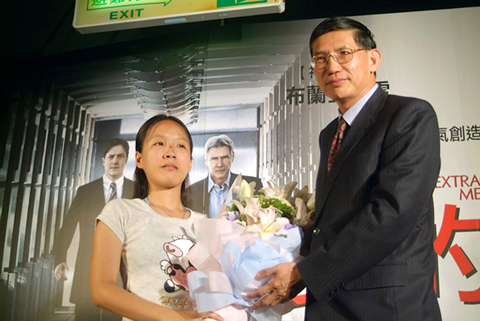The movie Extraordinary Measures tells the story of parents who formed a biotechnology company to develop a drug that could save the lives of children who have the rare life-threatening disease known as Pompe.
In the movie, which is based on the book The Cure, Harrison Ford plays research scientist Robert Stonehill, who was instrumental in finding the cure, while Brendan Fraser plays John Crowley, the man who raised US$100 million to buck the medical establishment.
In reality, John Crowley is the name of the person who started the biomedical company, but the real Dr Stonehill who developed the cure is in fact Chen Yuan-tsong (陳垣崇), director of Academia Sinica’s Institute of Biomedical Sciences.

PHOTO: CNA
At an event held earlier this week by the Taiwan Foundation for Rare Disorders to mark the debut in Taiwan of the movie’s DVD, Chen said he had mixed feelings watching the movie.
He said he began researching a cure for Pompe disease in 1991 after being saddened by the deaths of so many children from the affliction.
“Before I knew it, it had been 15 years,” he said. “It also surprised me that Hollywood would have made a motion picture out of it, making it the second movie about rare diseases and patients after Lorenzo’s Oil.”
Movie critic Roger Ebert said that Harrison Ford, as the film’s executive producer, probably saw Stonehill as a good role for himself and ordered a rewrite of the script because he could not play Chen.
Regardless of how Hollywood decided to recast Chen, his contribution to helping find the cure is well established.
He developed the treatment with colleagues at the Duke University Medical Center. His research and development was mostly done in the US, but Chen conducted his clinical trials for the cure — later named Myozyme — at National Taiwan University Hospital.
Myozyme, which took Chen and his team 15 years to research and develop, was introduced in Taiwan by US pharmaceutical company Genzyme and has been covered by the National Health Insurance (NHI) program since 2005, the foundation said.
Myozyme was sold in Europe and the US after it was approved by the US Food and Drug Administration and the EU health authority in 2006. It has contributed to saving the lives of more than 1,000 patients with Pompe disease, or acid maltase deficiency, worldwide each year, including 34 in Taiwan.
Young Pompe disease sufferers have symptoms similar to muscular dystrophy, the foundation said.
Without a cure, most children with Pompe disease die before they reach two years old. There is also a juvenile and adult form of the disease, which can appear at almost any age, the foundation said.
Currently, Pompe disease patients in Taiwan receive NT$7.9 million (US$245,577) per patient per year in Myozyme and related medical care under the NHI program, greatly reducing their families’ financial burden, the foundation said.
The foundation quoted tallies from the Cabinet-level Department of Health as indicating that there are nearly 6,000 families with rare disease patients in Taiwan, but more than 70 percent of them do not receive effective drugs or therapies, the foundation said.

Alain Robert, known as the "French Spider-Man," praised Alex Honnold as exceptionally well-prepared after the US climber completed a free solo ascent of Taipei 101 yesterday. Robert said Honnold's ascent of the 508m-tall skyscraper in just more than one-and-a-half hours without using safety ropes or equipment was a remarkable achievement. "This is my life," he said in an interview conducted in French, adding that he liked the feeling of being "on the edge of danger." The 63-year-old Frenchman climbed Taipei 101 using ropes in December 2004, taking about four hours to reach the top. On a one-to-10 scale of difficulty, Robert said Taipei 101

A preclearance service to facilitate entry for people traveling to select airports in Japan would be available from Thursday next week to Feb. 25 at Taiwan Taoyuan International Airport, Taoyuan International Airport Corp (TIAC) said on Tuesday. The service was first made available to Taiwanese travelers throughout the winter vacation of 2024 and during the Lunar New Year holiday. In addition to flights to the Japanese cities of Hakodate, Asahikawa, Akita, Sendai, Niigata, Okayama, Takamatsu, Kumamoto and Kagoshima, the service would be available to travelers to Kobe and Oita. The service can be accessed by passengers of 15 flight routes operated by

Taiwanese and US defense groups are collaborating to introduce deployable, semi-autonomous manufacturing systems for drones and components in a boost to the nation’s supply chain resilience. Taiwan’s G-Tech Optroelectronics Corp subsidiary GTOC and the US’ Aerkomm Inc on Friday announced an agreement with fellow US-based Firestorm Lab to adopt the latter’s xCell, a technology featuring 3D printers fitted in 6.1m container units. The systems enable aerial platforms and parts to be produced in high volumes from dispersed nodes capable of rapid redeployment, to minimize the risk of enemy strikes and to meet field requirements, they said. Firestorm chief technology officer Ian Muceus said

MORE FALL: An investigation into one of Xi’s key cronies, part of a broader ‘anti-corruption’ drive, indicates that he might have a deep distrust in the military, an expert said China’s latest military purge underscores systemic risks in its shift from collective leadership to sole rule under Chinese President Xi Jinping (習近平), and could disrupt its chain of command and military capabilities, a national security official said yesterday. If decisionmaking within the Chinese Communist Party has become “irrational” under one-man rule, the Taiwan Strait and the regional situation must be approached with extreme caution, given unforeseen risks, they added. The anonymous official made the remarks as China’s Central Military Commission Vice Chairman Zhang Youxia (張又俠) and Joint Staff Department Chief of Staff Liu Zhenli (劉振立) were reportedly being investigated for suspected “serious